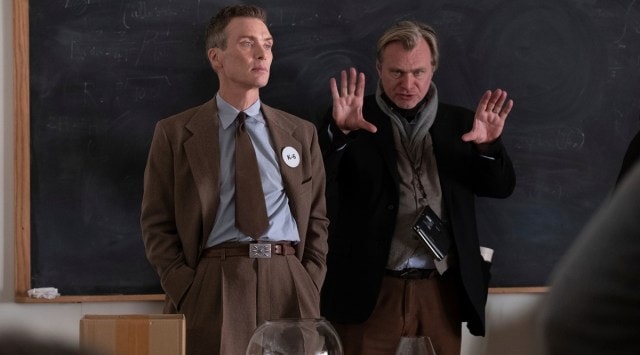Click for more updates and latest Hollywood News along with Bollywood and Entertainment updates. Also get latest news and top headlines from India and around the World at The Indian Express.
‘Oppenheimer never apologised for bombings of Japan, but…’: Christopher Nolan on why the physicist was ahead of his time
Director Christopher Nolan pointed out that Oppenheimer was full of paradoxes and ethical dilemmas, which was exactly what attracted him to this story. He also revealed if, hypothetically, he'd have built the bomb if he were in Oppenheimer's position.
 Actor Cillian Murphy, left, and filmmaker Christopher Nolan on the set Oppenheimer. (Melinda Sue Gordon/Universal Pictures via AP)
Actor Cillian Murphy, left, and filmmaker Christopher Nolan on the set Oppenheimer. (Melinda Sue Gordon/Universal Pictures via AP) Director Christopher Nolan’s recently released biographical thriller Oppenheimer has reignited interest in a profound and unresolved question that has intrigued people throughout history: can J Robert Oppenheimer, the American theoretical physicist regarded as the “father of the atomic bomb,” be held responsible for the tragic events in Hiroshima and Nagasaki in 1945?
Weighing in on the topic, Nolan pointed out that Oppenheimer was full of ‘paradoxes and ethical dilemmas’, which was exactly what attracted him to this story. “I am drawn to stories about people who are presented in paradoxes, individuals who make decisions that are hard to understand, perhaps because they don’t fully comprehend themselves. Oppenheimer is the most extreme example of this,” he said in a chat with physicist Brian Cox for Esquire.
Recalling how Oppenheimer never apologised for the bombing of Hiroshima and Nagasaki in 1945, and asserting that the physicist was, in a way, ahead of his time, Nolan said: “As with everything related to Oppenheimer, you can view things in very contradictory ways. If you look at it from the perspective of 2023, there are two ways to interpret his post-war actions. Although he was an eloquent and careful speaker, he never apologised for the bombings of Japan, nor did he express personal shame about his role in it. Nevertheless, all of his actions and policies post-1945 reflect those of a deeply guilty man, very aware of the consequences of his actions.”
“It’s this contradiction that I find truly fascinating. In a way, you can say he was ahead of his time; he may have been naive about how much he could stand up to the establishment, but many of his predictions and beliefs have proven to be true and continue to be validated,” he added. “They did foresee a lot of the consequences, they knew what they were doing, but they felt they had no choice,” Nolan said. “It’s an impossible dilemma. Somebody asked me the other day, ‘Would you have invented the bomb?’ If I look at history, the conversation between Isidor Rabi and Oppenheimer is compelling. The Nazis are trying to make a nuclear bomb, think of the consequences of that. They really felt they had no choice, and that’s what makes it dramatic.”
Oppenheimer is best known for having led the Manhattan Project, the American effort in the 1940s that resulted in the creation of the world’s first atomic bombs, which were dropped on the Japanese cities of Hiroshima and Nagasaki. Following the bombings, he became an advocate for the regulation of nuclear energy.
The film stars Cillian Murphy as Oppenheimer, with Robert Downey Jr, Emily Blunt and Matt Damon in pivotal roles.
- 01
- 02
- 03
- 04
- 05

































